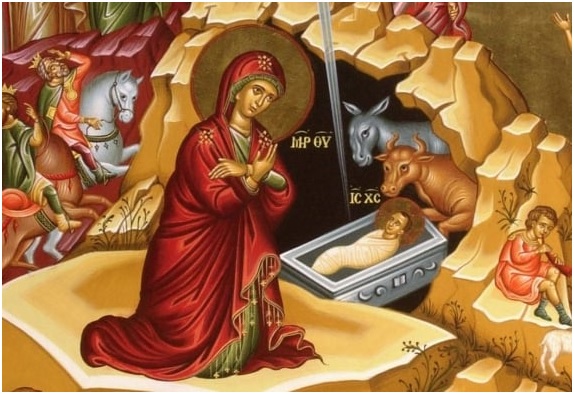Without Christ, nothing makes sense
27 December 2022‘Christ, by your word you bowed and stretched the heavens, and came and lay in the manger of irrational animals, wishing, out of love, to redeem us from our irrationality’ (ode 3, second canon of the Forefeast of Christmas).
The holy hymnographer is astonished at the mystery of the humility of the Creator, the Son of God: how, as Creator and almighty God, he consented to be enclosed in the little body of an embryo, to be born in a cave and to lie in a manger of irrational animals. And in the midst of his astonishment the poet understands, in faith, something which is inexplicable: the infinity of God’s love, which made him bend the heavens and descend to earth as a human person, as one of us, without sin. Without the love and kindness of the Creator, nothing in the Christian faith would be comprehensible, above all his nativity as a human person from the Holy Spirit and the Virgin Mary. Take love out of Christ’s advent as someone who bore our flesh for ever, that is eternally, and everything’s erased. But this can’t happen. Because God is love. This is what Christ revealed to us, and every well-intentioned person, in all times and in all places, responds to this revelation.

And what was the purpose of his coming into the world? To deify what he’d taken upon himself, as the holy poet tells us at another point. In other words, to return us to the direct prospect of our original destination: glorification and the likeness of God, unification with God, which we’d lost through our rebellion against God in sin. ‘God became human in order to make us God’. And in this particular hymn, the writer adds: this restoration of the human race means that we regain the rationale for our existence. Because, by erasing our relationship with the Son and Word of God, the aberration of sin makes us really lose our own rationale. We were created to extend and repeat our Creator, to be other gods alongside him who is God by nature. The irrationality of sin, however, is our own stupidity. To put it another way, because we’ve sinned, we’ve fallen into a state in which we forever recycle the loss of our true self and are perpetually wandering around blindly because of the darkness of our mind. ‘For this my son was dead and lost’. So we don’t see our Creator, nor ourselves, nor other people and not even our home, the natural environment. What name will we give to everything, since we’ve lost the ability to name, that is, lost our reason? Is it coincidental that, in this state, all we seek is the irrationality of magic and satanism?
God’s nativity as a human person, then, redeems us from our irrationality. People who believe in Christ regain their light, the true light which gives meaning to our existence and to the whole world. With Christ, all ‘mysteries’ are resolved, because, his presence explains everything. In other words, when we’re one with Christ, we cease to have questions, because we’re living with the Answer to everything. We become ‘all eyes’, which cast light on all the dark corners of ourselves and our surroundings. Of course, as we see in the lives of the saints, the first requirement of this charismatic state is a ‘straightforward’ heart. With no ifs or buts, we have to fall into God’s embrace and follow him by observing his holy commandments. Again, the inspiration of the holy hymnographer serves as our guide: ‘God has become likened to us, impoverished in the flesh so that he may enrich us in his glory. He who cannot be contained is born in a cave; let us welcome him in a proper spirit’ (ode 5, canon of the Forefeast of Christmas).






